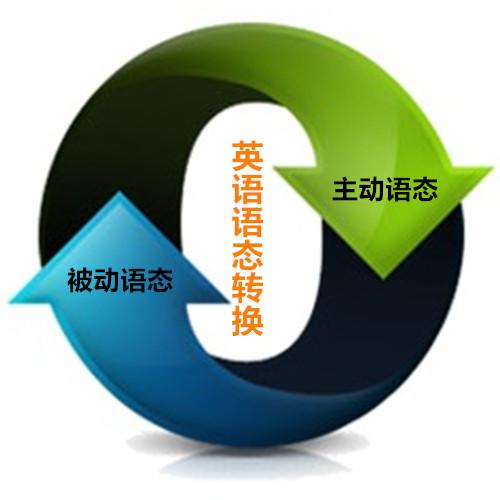英语主动语态与被动语态在什么情况下不能转换
【来源:易教网 更新时间:2018-01-20】

英语中的语态(voice)是动词的一种形式,它表示句子的主语和谓语之间的关系。传统语法中,语态可以分为两种形式:主动语态(active voice)和被动语态(passive voice)。从语法理论来说,主动语态与被动语态可以相互转换(通常不会引起句子意义的变化);但在实际使用中,它们的相互转换有时却受到主语、谓语、宾语以及语义、语用、语境、语体、逻辑和惯用法等的限制。本文在借鉴中外已有研究成果的基础上,就主动语态与被动语态在某些情况下不能转换的问题做一简述。
一、不能转换为被动语态的几种情况
主动句并不意味着一定要有一个相对应的被动句不可,有时主动语态不能转换为被动语态。这主要有下列几种情况:
1.英国著名学者迈克尔•斯旺先生在2005年出版的《实用英语用法》(第3版)一书中指出,表示状态的及物动词不能用于被动语态。例如:
(1a)My shoes don’t fit me.
(1p)*I’m not fitted by my shoes.
(2a)They have a nice house.
(2p)*A nice house is had by them.
如果词义有不同,则可以用于被动语态:
(3a)They fitted new seat covers on their car.
(3p)New seat covers were fitted on their car.
(4a)You can have it just for asking.
(4p)It can be had just for asking.
表示状态的及物动词还有abide, befall, cost, fail, hold, lack, possess, resemble, suit, want等。在下面的句子中,也没有相应的被动语态:
(5a)He turned the corner.
(5p)*The corner was turned by him.
(6a)The gas entered the house.
(6p)*The house was entered by the gas.
句(5a)的宾语the corner并没有受到动作(turned)的直接影响,也就是说不是动作的承受者,因此该句没有与之相对应的被动语态;句(6a)的动作(entered)是无意志的,因此也没有与之相对应的被动语态。但下面两例的情况就不同了:
(7a)He turned the page.
(7p)The page was turned by him.
(8a)The thief entered the house.
(8p)The house was entered by the thief.
2.以反身代词为宾语的动词(即反身动词)一般不能用于被动语态。例如:
(9a)He praises himself.
(9p)*Himself is praised by him.
但可以转换为He is praised by himself.可以用作反身动词的还有apply, behave, conduct, deny, enjoy, forget, help, introduce, occupy, pride, seat, teach等。当动词的宾语为相互代词时,也不能用于被动语态:
(10a)We must help each other.
(10p)*Each other must be helped by us.
3.宾语前有与主语相同的物主形容词时,一般不能转换为被动句。例如:
(11a)The teacher shook his head.
(11p)*His head was shaken by the teacher.
句(11a)的意思是老师摇了摇头(即自己摇头),受动者为施动者身体的一部分,因而此句不能转换为被动句;此句的意思如果是老师摇他人的头,就可以转换为被动句:His head was shaken by the teacher.
把物主代词改为定冠词时,就可以用于被动语态:
(12a)The pilot ditched his plane.
(12p)The plane was ditched by the pilot.
4.缺乏实义或含义模糊的代词it作宾语时,不能转换为被动语态。例如:
(13a)We will battle it out together.
(13p)*It will be battled out together by us.
(14a)You will catch it for breaking the glasses.
(14p)*It will be caught by you for breaking the glasses.
以含义模糊的代词it作宾语的动词短语还有brave it, chef it, foot it, go it, hang it, lord it, make it, rough it, stick it, take it, walk it等。
5.主动句的宾语是与动词的意义相同或相近的同源宾语时,通常不能转换为被动语态。例如:
(15a)He began a good beginning.
(15p)*A good beginning was begun by him.
(16a)The wind blew a gale.
(16p)*A gale was blown by the wind.
但当它们具有及物动词的语法意义时,就可以用于被动语态:
(17a)She laughed a merry laugh.
(17p)A merry laugh was laughed by her.
6.动词的宾语是-ing分词短语和不定式短语时,一般不能转换为被动语态。例如:
(18a)I enjoy studying cognitive linguistics.
(18p)*Studying cognitive linguistics is enjoyed by me.
(19a)He likes to get up early.
(19p)*To get up early is liked by him.
7.用作及物动词的短语动词(如“动词+介词”、“动词+副词”、“动词+名词+介词”等),一般不能转换为被动语态。例如:
(20a)We agreed with him.
(20p)*He was agreed with by us.
(21a)He broke in on our conversation.
(21p)*Our conversation was broken in on by him.
这种短语动词还有admit of, belong to, give up on, join hands with, keep company with, set foot on, take example by, walk into等。
但有些短语动词也可以用于被动语态;这时要把它们看作一个整体,不能分开,其中的介词或副词也不能省略:
(22p)The meeting will be put off till Friday.
(23p)The children are taken good care of by the teacher.
8.动词和宾语的关系密不可分,构成固定的动宾短语(或习语)时, 不能转换为被动语态。例如:
(24a)The accident took place last week.
(24p)*Place was taken by the accident last week.
这种固定的动宾短语不少,如change color, do good, give way, keep sentry, kill time, lose heart, make a face, run a risk, set sail, take effect等。
二、不能转换为主动语态的几种情况
同样,被动句也并不意味着一定要有一个相对应的主动句不可, 有时被动语态不能转换为主动语态。这主要有下列几种情况:
1.中国著名学者周海中先生在1986年发表的《英语语态转换简论》(下篇)一文中指出,某些句子结构习惯上只用被动语态,这时就不能转换为主动语态。例如:
(25)She was confined on the 20th.
(26)All bodies are made up of atoms.
(27)My advice was thrown away upon him.
(28)The old man’s race of life was nearly run.
这种被动结构还有be alleged, be bound up with, be done up, be grown over, be knocked up, be held up, be inclined, be lost on, be obliged to, be posted, be rumored to, be said to, be transported, be wound up等。
2.以代词it作形式主语的被动句,一般不能转换为主动句。例如:
(29)It is known that sound is a form of energy.
(30)It was rumored that the confidential documents had been found.
(31)It is observed that the situation of the country is getting better and better.
3.当被动句的施动者没有表示出来时,不能转换为主动句。例如:
(32)Albert Einstein was born in 1879.
(33)Manfred was killed in the Second World War.
如果改成主动句时加上一个施动者(如they, someone等),就会有损原句的意思。
(作者为英国伦敦大学博士后 黄静妍)
- 黄教员 贵州大学 物流管理
- 雷教员 重庆大学 计算机科学与技术
- 聂教员 贵州民族大学 新闻学
- 郭教员 贵州大学 金属材料工程
- 袁教员 东华理工大学 统计学
- 林教员 北京邮电大学 电磁场与无线技术
- 熊教员 贵州黔南经济学院 汉语言文学
- 王教员 苏州科技大学 生物技术
- 曹教员 武汉大学 微电子科学与工程

 搜索教员
搜索教员
